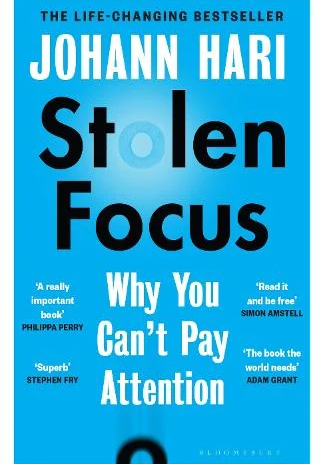As I sat down to start writing this blog, a notification popped up on my desktop messaging app. “Better take a look,” I thought. “Could be urgent.” It wasn’t. So where was I… ?
That’s it, what to say about… Oh wait up, what’s this? An email alert from the boss. Can’t ignore that. And my phone just pinged me. And before you know it, an hour’s gone by and this blog is going nowhere.
It’s a problem we’ve likely all faced. It’s difficult to give your attention to just one thing over the course of a working day. When did you last manage it? So many other nudges, notifications and essential updates jostle for your attention.
And that’s just the work stuff. Add all the funny noises my phone makes, and a bad day can be a constant battle to concentrate on anything.
A Crisis of Focus
This is a relatively recent phenomenon. But it’s getting worse. How much worse? Well, as Johann Hari is keen to explain in his book “Stolen Focus: Why You Can’t Pay Attention,” the forces determined to attract and keep our attention are everywhere, and they’re enormously powerful.

And we aren’t doing enough to help ourselves. Sound like something from the “Matrix” movie franchise? It’s not. “Stolen Focus” isn’t a bunch of conspiracy theories. It’s based on many interviews with leading experts in everything from Big Tech to sleep deprivation.
And the picture they paint is a disturbing one.
The Battle for Attention
First, they really are out to get us. There are whole industries dedicated to grabbing our attention. They offer what we think of as rewards – bonus points, membership privileges, that sort of thing – and in return we give them our data.
Then they use that data to build complex profiles of us so that they can put adverts before us for things they know we want.
If that sounds sinister, consider what else behavioral scientists and data analysts can use that data for. They can predict not just what we might want to buy, but what we think about bigger issues. Even how we might vote. If they can predict something, they will likely try to influence it.
Sure, we can switch off our devices. We can lock them away. If we’re lucky, we can escape to remote locations – as Hari does. But we’re still susceptible. We’re still experiencing something close to addiction.
How We Steal Our Own Focus
Second, we harm our own attention from the moment we get up. All too often we grab high-fat, high-sugar snacks rather than proper food. We expose ourselves to brain-damaging pollution daily.
When we do finally put aside the screens to go to bed, we can’t sleep properly. So our brains are exhausted, and our ability to focus takes another knock.
Many of us also live in cultures that value the quick fix. So doctors prescribe vast quantities of drugs to treat ADHD, depression and sleeplessness, while leaving the root causes untouched.
In some cases, these causes are to do with innate psychological problems and brain chemistry. But for many people, maybe most, it’s the environment in which they live that’s the problem.
The Will to Change – and Why We Often Can’t
There’s another insidious factor at work, and again it’s cultural. Hari calls it “cruel optimism.” We all want to believe that we can change. That belief should be empowering.
But it’s double-edged. If we fail to give up junk food, Twitter, or playing video games until 3 a.m., it’s on us. Our willpower’s the problem. Never mind that billions of dollars are spent every year trying to overcome that willpower.
Reclaiming Our Attention
It’s a grim picture. So are there any positives? Well, we can take steps to change the way we behave as individuals, cruel optimism or not. Hari outlines them. And we can learn lessons from some societies that have taken steps to address this constant erosion of attention.
But Hari’s main targets throughout are larger scale. They’re industrial complexes and dysfunctional societies. And they will only change how they behave through collective action. Whether it’s because customers or activists demand it, or governments enforce it, it’ll still be a long-term battle.
“Stolen Focus” is a wake-up call. It deserves our attention – if we can spare it. Because the consequences of whole societies being in a state of distraction are dire. They certainly go beyond whether this blog gets finished or not.
So I’ll definitely be turning off the laptop earlier, and spending more time with a good book. As soon as I’ve checked Twitter, obviously.
Listen to Our “Stolen Focus” Book Insight
We review the best new business books and the tested classics in our monthly Book Insights, available as text or as 15-minute audio recordings.
So, if you’re a Mind Tools Club member or corporate user, listen to the “Stolen Focus” Book Insight now!
If you haven’t already signed up, join the Mind Tools Club and gain access to our 2,400+ resources, including 390+ Book Insights. For corporate licensing, ask for a demo with one of our team.

About the Author
Simon has been researching, writing and editing non-fiction for over 30 years. In that time he’s worked on educational courses, scientific journals, and mass-market trade books about everything from popular psychology to buying houses in Bulgaria. In the last 20 years he’s specialized in simplifying complex subjects, and helping readers to learn new skills. Away from work he listens to good music, watches bad football, and is fascinated by medieval history.



